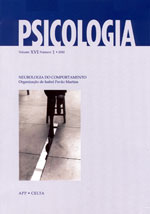Specific speech and language impairments in children: assessments, diagnostics, classification and outcome
DOI:
https://doi.org/10.17575/rpsicol.v16i1.467Resumo
Specific Language Impairment (SLI) is an heterogeneous disorder characterized by an inadequate development that cannot be explained by an auditory sensory defect, a motor-neurological defect, a general cognitive impairment nor an unwillingness to communicate. There are many subtypes of SLI, both in severity and type that may be associated with a different outcome. Although many of these children recover clinically, the majority will maintain minor language impairments leading to a poor school achievement and learning difficulties. A proportion of cases remain severely impaired causing social isolation and an occupations/professional handicap. The origin of these syndromes is probably genetic. Although the are assumed to reflect a dysfunctional of the neuronal networks subserving the comprehension,, elaboration and production of language, they are not due to evident focal brain lesions, but are associated with atypical patterns of cerebral dominance and specialization for language. A variety of language processing impairments have been described in these children, namely a difficulty in analyzing rapidly changing speech sounds, acquiring language morphology and grammar and a poor phonological memory. Therapeutic intervention in these children must be individualized and interdisciplinary (speech therapy, alternative forms of communication, psychological support and special education). This is essential to prevent social isolation, low self-esteem, emotional and behavioral symptoms and educational problems.


